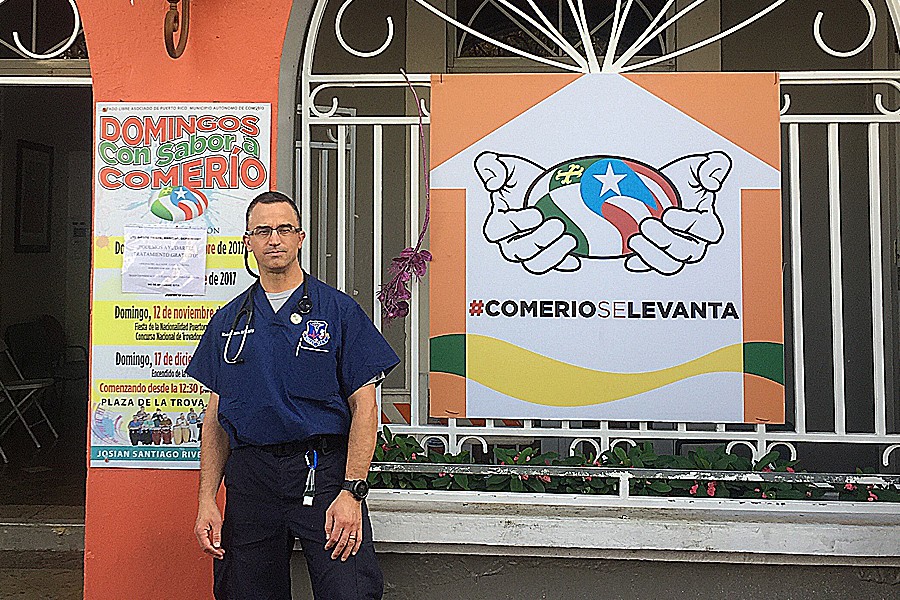For Gai Cole, DrPH, driving into San Juan after sunset eight days after Hurricane Maria slammed into Puerto Rico as a Category 4 storm brought back memories of his service in the U.S. Army, when he was deployed to Sarajevo in the 1990s.
"The place just looked almost post-apocalyptic," says Cole, who is CEPAR's senior adviser for strategic planning. "It seemed lifeless. You couldn't see any people in the dark buildings and homes." It was, however, a much different scene at the casino next to the convention center in San Juan. "The casino was fully operational with patrons eating and gambling," he recalls. "It was a very strange contrast."
Cole was one of several employees from Johns Hopkins who left their homes, families, and jobs to deploy in response to the aftermath of recent hurricanes. Cole and six others worked as members of the federal disaster medical assistance teams, known as DMATs, within the U.S. Department of Health and Human Services.
Michael Millin, MD, MPH, an associate professor of emergency medicine, heeded the call to serve as a chief medical officer with a DMAT, heading to Puerto Rico only about two weeks after returning from a similar deployment to Florida in response to Hurricane Irma.
Millin was stationed in Comerio, a rural, mountainous area in the central eastern part of Puerto Rico. He was part of an 11-member team that saw about 400 patients during their 12 days working at a makeshift clinic at the mayor's office. The team treated wounds, skin and eye infections, bites from stray dogs, diarrhea from lack of clean drinking water, and chronic medical conditions. Millin also made house calls to people living in the mountains. "There was a patient I saw who was in a small home, and right next door, a home had slid off into the mountainside," Millin says. "The power infrastructure was entirely down, with trees down everywhere, and this was four or five weeks after the hurricane."
Cole, who also had deployed to Florida for Hurricane Irma, served as the administrative officer stationed at the Hospital de la Concepción in San Germán, a rural, mountainous region on the west side of Puerto Rico. Cole coordinated all the team's logistics within the 500-year-old hospital, such as access to clinical systems and the hospital medication list, pay, time tracking, travel vouchering, and patient throughput and billing. In the past five years, the hospital, Cole says, had invested in structural resilience and disaster preparedness and recovery efforts. These included a robust generator that could run on recycled fuel and a water filtration system.
"So while they were only cooking one meal a day at first for patients and staff, and they did suffer some structural damage, they were able to sustain hospital operations very effectively," Cole says. He adds that Hospital de la Concepción was the only hospital in the area that was able to remain fully open. "What I witnessed in Puerto Rico was a genuine need for help. There was an exigent need for medical support, electricity, water and food distribution, and law enforcement," Cole says. He also describes how the lack of phone and internet service left his team removed from the rest of the world. "The shooting in Las Vegas happened, and I didn't hear about it until the next day by word of mouth," he says. "We were in an information blackout, just focused on the mission and the patients."
Millin says his team built relationships with local physicians, pharmacists, and activists to help better stabilize the community of Comerio. However, he believes the community will be affected for a long time. Millin, who also responded after the Haiti earthquake, says his time in Puerto Rico will be a defining moment in his life. "There's a part of my heart that will always be in Puerto Rico. There's a part of my heart that still lives in Haiti," Millin says. Every time I've deployed out, a part of me stays there because the work is so meaningful to me."
Others from Johns Hopkins who deployed with DMATs in response to recent hurricanes include Christina Catlett, MD; Edward Johnston, RN, BSN; Jessica Katznelson, MD; Brandon Parkyn, RN; and Ben Bigelow, a School of Medicine student.
Check out details from some of their service in their own words in this article.
To learn more, see these related stories:
- ABC2 News: Hopkins physician provides medical care to hurricane victims in Puerto Rico
- Fox 45 News: Hopkins doctor in Puerto Rico
Go to the CEPAR website for more stories from the Hopkins on Alert newsletter.
Posted in News+Info








